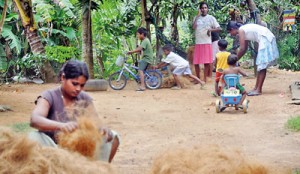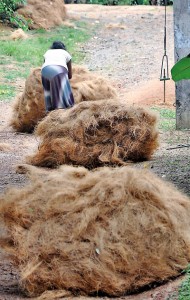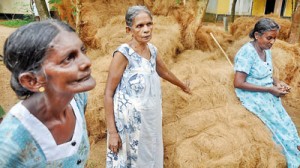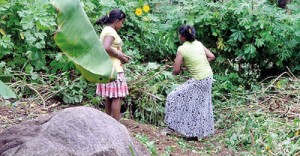News
Tsunami survivors fighting for survival
View(s):
Story and pix by Nilan Maligaspe.
To the inhabitants of Austrian Tsunami Village at Galagoda in Galle, though a decade has passed since the Boxing Day tsunami of December

A woman sorts out the raw coir while children play in the background
26th the disaster is no distant memory. Life has moved on, but eking out a living has not been easy.
The houses gifted to them by the Salvation Army under Austrian funding are now dilapidated. This has added to life’s burdens.
Many a village woman makes rope as a means of adding a few rupees to the income their husbands make as fishermen. Some also cultivate veges on the adjoin reservation lands.
Ms. Devika can be seen rolling a bale of coir up a slope while her elderly mother stands despondently with her hands on her hips.

The women manually transport bundles of coir from the collecting point to their gardens
Coir to manufacture the rope is brought in by coir mill owners who live at the periphery of the village and is dumped at a central point. The women of the village are in fact merely glorified labourers in this ‘cottage industry’.
They manually transport the bundles of coir to their yards where the coir is sorted out and turnedinto rope on weaving machines -made-up of scrap material comprise a cycle wheel, braces and bits of wire.

The raw coir needs to be sorted out before being turned into rope
A kg of rope sells at Rs. 25, and a weaver must make at least ten ropes to get a kg. The finished product is sold to retail shops or distributors, who resell it for approximately Rs. 30 a piece.
Sadly the profits do not flow to these women who are the lower prongs on the rope ladder. Again they are not the only producers and must compete with women from the surrounding villages who have been traditionally engaged in rope-making as a profession.

Women also cultivate on the adjoining reservation land as a means of making ends meet

